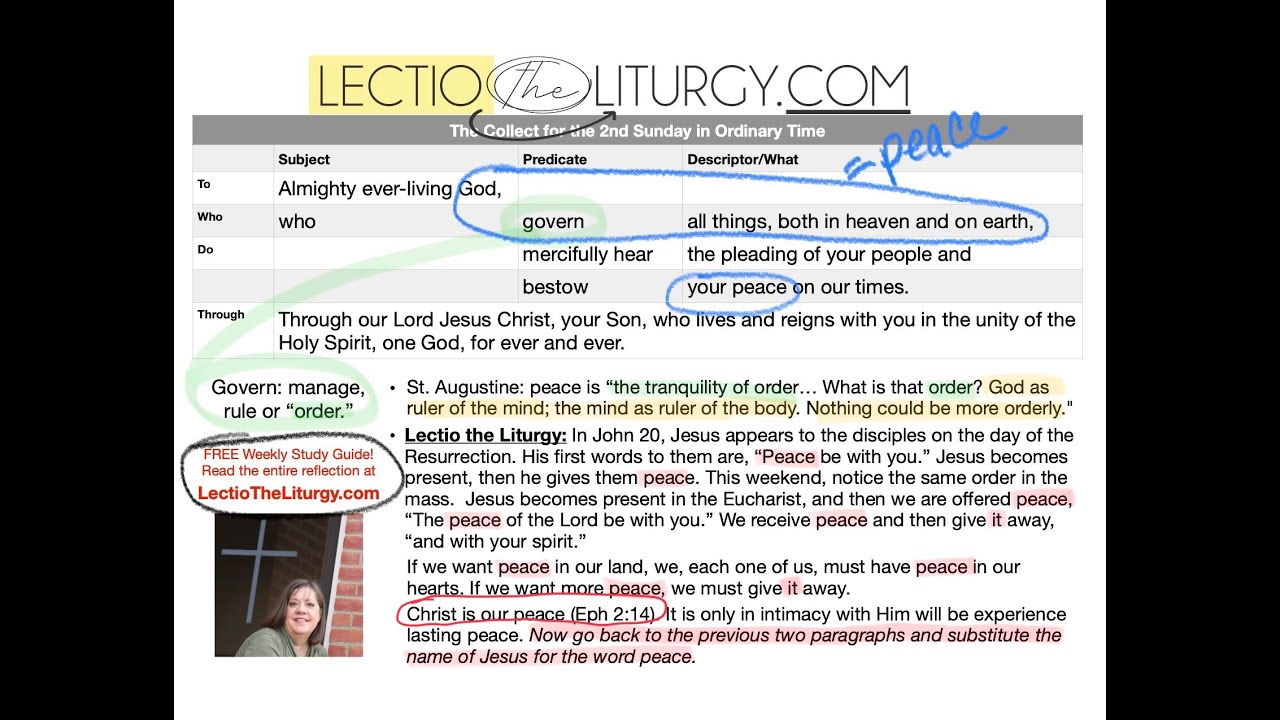The Collect for the 2nd Sunday in Ordinary Time
Almighty ever-living God, who govern all things, mercifully hear the pleading of your people and bestow your peace on our times. Through our Lord Jesus Christ, your Son, who lives and reigns with you in the unity of the Holy Spirit, one God, for ever and ever.
I wish I had a dollar for every person who, in the last month, has remarked to me about how they wish we had peace, or they’ve said, “I just need peace.” How timely that this prayer has come along.
Govern is defined as manage, rule or “order.” God puts in order all things, in heaven and earth, at the same time. We may recognize it by another phrase, “Thy will be done on earth as it is in heaven.”
“Mercifully hear the pleading of your people” doesn’t need much explanation. I know I’m not the only one who has plenty of practice at pleading.
But about the next line: bestow your peace on our times…
How would you define peace? The absence of war? Or maybe everyone just getting along? Worldly peace is often built on compromise, or it can tell us we’re at peace when everything is going our way.
God’s peace is different. According to St. Augustine, peace is “the tranquility of order.” An order that God has put in place, and God is at the heart of it. I love it when the definition I’m looking for is right in the prayer: peace is all things, both in heaven and on earth, in God’s order.
In his encyclical, Pacem in Terris, then Pope John XXIII writes, “The world will never be the dwelling place of peace, till peace has found a home in the heart of each and every man, till every man preserves in himself the order ordained by God to be preserved.
”What is that order? He continues with a quote from St. Augustine: “God as ruler of the mind; the mind as ruler of the body. Nothing could be more orderly." (165)
In the second reading this weekend, Paul writes to the Corinthians, reminding them how their sin affects their body and that their body is a temple of the Holy Spirit. What makes the body want to sin? According to St. Augustine, it’s a mind that is not under the rule of God.
Another example, let’s look at Jesus, the Prince of Peace (a title that was given to him 700 years before his birth, see Isaiah 9:6). Jesus kept his mind on the mind of God, his mind was the ruler of his body. He had peace, even through his Passion, because his mind continually sought the will of his Father.
We need look no further than Jesus to know more about God’s peace, because He is our peace. That doesn’t mean that we’ll be calm and serene 24/7, we will still experience emotions brought by fear, stress, sadness, anxiety. We must be vigilant. These emotions are part of being human, but we must not let them take away our peace.
Lectio the Liturgy: In John 20:19-21, Jesus appears to the disciples on the day of the Resurrection. His first words to them are, “Peace be with you.” Jesus becomes present, then he gives them peace. This weekend, notice the same order in the mass. Jesus becomes present in the Eucharist, and then we are offered peace, “The peace of the Lord be with you.” We receive peace and then give it away, “and with your spirit.”
If we want peace in our land, we, each one of us, must have peace in our hearts. If we want more peace, we must give it away.
Ephesians 2:14 tell us that Christ is our peace. It is only in intimacy with Him will be experience lasting peace. Now go back to the previous two paragraphs and substitute the name of Jesus for the word peace.
